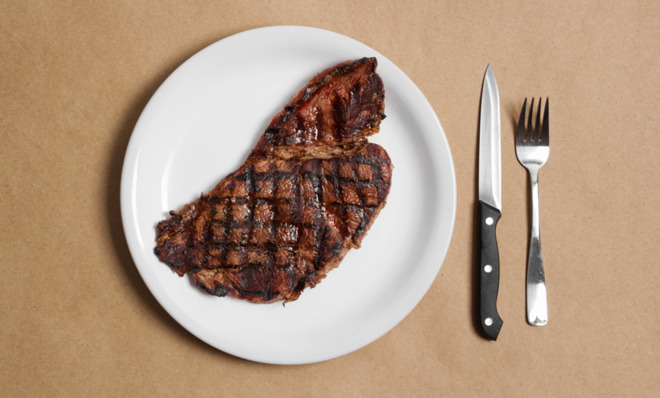Soylent food is here — and it is tyrannical
Food substitutes are not a boon for the future, they are the draught of tyranny


I learned a lot about eating from Frankie, one of New York City's best street photographers who also happens to be homeless.
I met him several times in the Financial District in New York City when he was hanging out by a Chipotle near Water Street. In our few conversations he told me a lot I didn't know about being homeless. For instance, homeless men can have really cool Tumblrs. He also told me he preferred sleeping in Central Park to shelters. There you could at least watch the stars. Plus, you were less likely to be urinated on by an incontinent junkie or listen to a religious person demand that you hit rock bottom to find the Lord.
Frankie also told me that food stamps weren't as much of a help as they should be, since he couldn't buy the sort of prepared food that is useful to someone who lives on a street. The rules of the program only allow him to buy stuff that can be cooked on a stove or in a microwave, neither of which fit in a backpack. While Frankie occasionally came into enough cash to think about renting an apartment, he explained to me why risking a security deposit in a neighborhood that's more dangerous than the streets was uneconomical. It would have been a different calculation if he was physically vulnerable, a woman, handicapped, or elderly. So what did Frankie like to do when he got some real money to burn? He went to nice restaurants and had extravagant steak dinners. And that's what I love about Frankie, a man in full.
The Week
Escape your echo chamber. Get the facts behind the news, plus analysis from multiple perspectives.

Sign up for The Week's Free Newsletters
From our morning news briefing to a weekly Good News Newsletter, get the best of The Week delivered directly to your inbox.
From our morning news briefing to a weekly Good News Newsletter, get the best of The Week delivered directly to your inbox.
Which brings me to the distressing hype that accompanies "Soylent," the Silicon Valley invention that just began shipping to subscribers this month. Soylent is a kind of nutritional food replacement that has very little taste to recommend it and is said to give the person who drinks it all the nutrients they need without all the "hassle" of food. It has a mouthy, slightly gritty pancake-batter feel to it, and has a color I would describe as Condé Nast intern beige. And yes, it is named after the silly film about humans eating processed humans. One of Soylent's creators, Rob Rhinehart, was interviewed by The New Yorker, and explained his attitude about food and nutrition:
Rhinehart, who is 25, studied electrical engineering at Georgia Tech, and he began to consider food as an engineering problem. "You need amino acids and lipids, not milk itself," he said. "You need carbohydrates, not bread." Fruits and vegetables provide essential vitamins and minerals, but they're "mostly water." He began to think that food was an inefficient way of getting what he needed to survive. "It just seemed like a system that's too complex and too expensive and too fragile," he told me. [The New Yorker]
People are already hailing Soylent as "The End of Food," and a bounty for the unfortunate. The very thoughtful Bhaskar Sunkara, for instance, is praising the invention as good for socialism because it can give nutrients to the poor and hungry. It can wipe out much difficult and dangerous agricultural work, he says, and hell, it can even do some work for the sexual revolution. He writes:
This development would have feminist implications as well. A world without food would also be a world without cooking — part of unpaid household work that's disproportionately left to women. Overcoming it is, in addition to everything else, a victory against the sexual division of labor. [Al Jazeera]
Sunkara assures us that conventional food will always exist for entertainment, leisure, and socialization, although I'm not sure the egalitarian project taken far enough would allow the unequal distribution of that pleasure.
Freddie deBoer is less hopeful. He sees the potential for Soylent to be forced onto the dependent and the poor, with disastrous consequences:
A free daily email with the biggest news stories of the day – and the best features from TheWeek.com
And an immensely important, immensely destructive social and cultural shift takes place: Food, long our definition of a minimal requirement for life, becomes instead a luxury good. The affluent continue to eat food — real, tasty, nutritious (or not) food. But for the poor, real food becomes a symbol in the way that flat-screen TVs and cellphones are now symbols, as luxuries that the affluent insist poor people should not own. [Interfaces of the Word]
DeBoer is exactly right, although Frankie offers a correction. A cellphone was something "most of us [homeless] have" Frankie informed me before urging me to see his Instagram account. But surely, Soylent is exactly the kind of paternalistic welfare ration that could be conceivable. We can see the same paternalism in food stamps that urges Frankie to buy bags of rice he cannot cook rather than a tomato wrap he can eat now, while he enjoys the fresh air and the hunt for beautiful bodies to photograph.
What Soylent's proponents don't seem to understand is that food cannot be reduced to mere nutrition anymore than all of movement can be reduced to simple exercise, or sex and parenthood to mere reproduction (although in the latter case, the more strenuous socialists have tried!). Mealtime is a place of communion, conviviality, even sensuality. It is where we learn to be human.
Food production teaches us gratitude, because even with all the advances of chemistry and industrial agriculture, we did not invent photosynthesis, or the sun and the rain. We know, or ought to know, that living things were made to die for our sake. There is a satisfaction, difficult to articulate, in making one's own meal that cannot be found in the mere detritus of packaged meals. Yes, preparing food for others can be hard, annoying work. But as Gracy Olmstead points out in her fantastic defense of family mealtime, it is usually more than compensated in an enriched family life and affection. But in the autistic way that Marxists reduce so many human activities to the detested category of labor simpliciter, they also incinerate labors of love.
In ancient Israel, Levitical law urged Jews to leave the edge of their land unreaped "for the poor and the foreigner among you." This was a kind of hospitality that reached to the very edge of your property, reflecting a hospitality on the inside of one's home. The divine injunction to feed the hungry may require, in an extraordinary circumstance, something like Soylent. But merely stuffing unfortunates with nutrients apart from the ritual, spiritual, and social meaning of our own food ways is a form of abuse. It reduces man to an engine. This is precisely why it appeals to the ideologues of Silicon Valley as much as it does to the later disciples of Das Kapital. In their worldview humans are not here for themselves, and their families; they are here to hasten the perfected future where "people like us" rule them.
I stand with Frankie and for the extravagance of common pleasures, for the sacrifices that make us grateful, for the food ways that connect us to our environment, to our friends and families, and to a God who comes as a lamb and offers us his flesh. Frankie eats at nice restaurants to feel like a human, to be served by others in a way that is social, even spiritual. Let the partisans of austerity scold Frankie for improvidence, let the disciples of socialist efficiency choke on Marx's milkshake. For Frankie, and for everyone who makes a home in this, the only created world: Let them eat steak.
Michael Brendan Dougherty is senior correspondent at TheWeek.com. He is the founder and editor of The Slurve, a newsletter about baseball. His work has appeared in The New York Times Magazine, ESPN Magazine, Slate and The American Conservative.
-
 Political cartoons for January 4
Political cartoons for January 4Cartoons Sunday's political cartoons include a resolution to learn a new language, and new names in Hades and on battleships
-
 The ultimate films of 2025 by genre
The ultimate films of 2025 by genreThe Week Recommends From comedies to thrillers, documentaries to animations, 2025 featured some unforgettable film moments
-
 Political cartoons for January 3
Political cartoons for January 3Cartoons Saturday's political cartoons include citizen journalists, self-reflective AI, and Donald Trump's transparency
